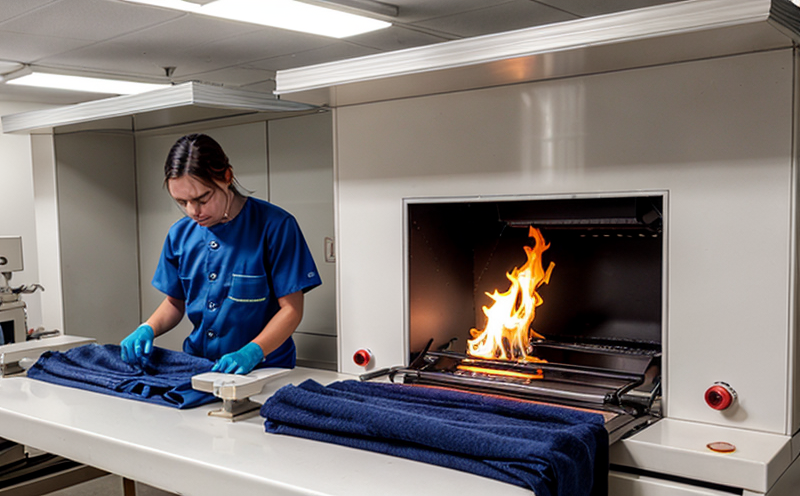Smoke Production Measurement from Burning Fabrics
The measurement of smoke production during the combustion process is a critical aspect of fire safety testing in textiles and apparel. Smoke release contributes significantly to the spread of fires, leading to increased risks for individuals exposed to such environments. This service focuses on quantifying the amount of smoke produced by fabrics when subjected to controlled burning conditions.
Smoke production is measured using various techniques that capture both visible and invisible components released during combustion. The primary focus here is not only on the volume of smoke but also its characteristics, including opacity, particle size distribution, and chemical composition. These parameters are essential for understanding how a fabric will behave in real-world fire scenarios.
The testing procedure typically involves placing specimens into a specially designed chamber where they are exposed to controlled heat sources under prescribed conditions. The chamber is equipped with sensors capable of detecting changes in temperature, pressure, and optical density as the specimen burns. Data collected from these sensors provides insights into the quantity and quality of smoke generated.
Once testing is complete, detailed reports summarizing all relevant data points are provided. These documents serve multiple purposes including compliance verification with international standards such as ISO 13565-2 for horizontal burning tests on fabrics and ISO 5290 for vertical burning tests on textiles. Compliance officers can use this information to ensure their products meet regulatory requirements.
For R&D engineers, this service offers valuable data that helps refine product designs by identifying potential areas of improvement regarding flammability performance. By understanding which fabrics produce more smoke than others under identical conditions, manufacturers can make informed decisions about material selection and processing methods.
Incorporating insights gained from this type of testing into new product development processes ensures safer products for consumers while also enhancing brand reputation through demonstrated commitment to responsible manufacturing practices.
Why It Matters
Smoke production during fire incidents can exacerbate the severity of burns suffered by individuals caught in flames. In addition, thick clouds of smoke obstruct visibility, making escape from burning buildings more challenging. Smoke also poses respiratory hazards for survivors and first responders alike.
Incorporating rigorous smoke production measurements into textile and apparel manufacturing processes helps mitigate these risks by ensuring that materials used are inherently less likely to contribute significantly to smoke formation when exposed to fire. This proactive approach not only enhances consumer safety but also supports broader efforts aimed at reducing the overall impact of fires on communities.
From a regulatory perspective, compliance with established standards like ISO 13565-2 ensures that products are subjected to consistent evaluation criteria across different regions worldwide. Meeting these requirements builds trust between manufacturers and authorities responsible for enforcing safety regulations.
For R&D teams, investing time in refining products based on accurate smoke production measurements allows them to innovate more effectively within the context of fire safety standards. This focus contributes positively toward creating safer environments both inside buildings and outdoors where fabrics may encounter open flame sources.
Eurolab Advantages
At Eurolab, we pride ourselves on providing comprehensive testing solutions tailored specifically to meet the unique needs of our clients within the fire safety sector. Our team consists of experienced professionals who possess deep knowledge across various facets of textile and apparel flammability testing.
We employ state-of-the-art equipment capable of accurately measuring smoke production according to recognized international standards such as ISO 13565-2 and IEC 60695. Our facilities are equipped with high precision instruments designed to detect even the smallest changes in optical density, ensuring reliable results every time.
Our commitment extends beyond just performing tests; our experts offer guidance throughout the entire process from initial consultation regarding test parameters right through to interpretation of final reports. This holistic approach helps clients better understand their options and make well-informed decisions about product development and improvement initiatives.
We ensure strict adherence to quality assurance protocols at all stages of testing, guaranteeing consistent accuracy and reproducibility in our findings. By leveraging our expertise and resources, Eurolab enables clients to stay ahead of evolving market trends while maintaining compliance with relevant regulations.
International Acceptance and Recognition
The methods employed by Eurolab for smoke production measurement from burning fabrics are widely accepted internationally due to their adherence to globally recognized standards such as ISO 13565-2 and IEC 60695. These guidelines provide clear instructions on how specimens should be prepared, ignited, and monitored during testing.
Adherence to these international norms ensures that the results obtained are comparable across different countries and regions, fostering trust among stakeholders involved in textile and apparel manufacturing worldwide. Compliance with such standards enhances market access opportunities for manufacturers who can confidently demonstrate their products' safety features on a global scale.
In addition to being recognized by industry leaders, our services have been endorsed by numerous governmental bodies responsible for enforcing fire safety regulations globally. This backing further reinforces the credibility and reliability of our testing methodologies.





